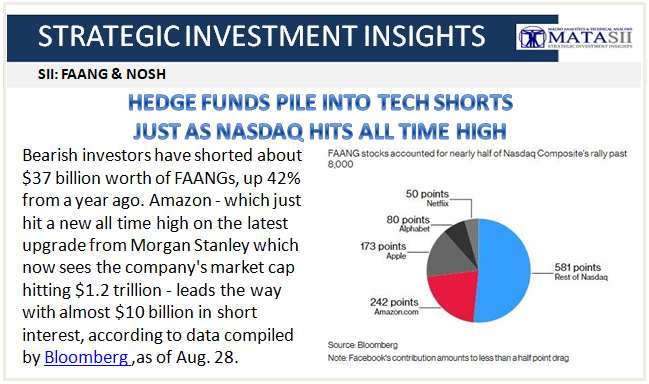HEDGE FUNDS PILE INTO TECH SHORTS - JUST AS NASDAQ HITS ALL TIME HIGH
-- SOURCE: 08-29-18 - "Hedge Funds Pile Into Tech Shorts Just As Nasdaq Hits All Time High" --
One week ago we reported that even as the market hit fresh all time highs, the hedge fund community has had a(nother) terrible year, with YTD return for the average equity hedge fund now a negative 1%.
There were three main reasons for that: the sharp underperformance of some of the most beloved "hedge fund hotel" stocks such as Facebook, which was the most widely held hedge fund stock as of June 30 just before it tumbled in July, a correction from which it has so far failed to recover...
... an acute decline in net exposure as most hedge funds pulled back from a market which has been painfully unpredictable for the "smart money"...
... but most of all, as a result of the relentless short squeeze that continues to push the most hated stocks relentlessly higher. According to Goldman, a basket of the 50 Russell 3000 stocks with market caps greater than $1 billion and the largest outstanding short interest as a share of float has outperformed the S&P 500 by 14 percentage points YTD (+21% vs. +7%), with concentrated shorts outperforming primarily in favorite hedge fund sectors including Info Tech.
Many have speculated that this rolling entry of shorts - mostly in the FAANG names - followed by prompt short covering (given a helping hand by corporate stock buybacks), has been one of the factors behind the Nasdaq's straight line levitation to new all time highs.
So in light of the constant pain that shorts have suffered to over the past year in shorting tech - demonstrated most famously by David Einhorn whose short tech basket has cost him double digit P&L this year - one would assume they had learned their lesson.
They have not. In fact, according to the latest data from financial analytics firm S3 Partners LLC, short positions against FAANGs have surged by more than 40% in the past year as investors continue to bet against the biggest drivers of the global bull market.
The latest data reveals that bearish investors have shorted about $37 billion worth of FAANGs, up 42% from a year ago. Amazon - which just hit a new all time high on the latest upgrade from Morgan Stanley which now sees the company's market cap hitting $1.2 trillion - leads the way with almost $10 billion in short interest, according to data compiled by Bloomberg ,as of Aug. 28.
"Tech stocks have had a large run-up in price this year," S3 head of research Ihor Dusaniwsky told Bloomberg "The greater the rise, the greater the fall so they are being targeted as the stocks to short. With the bull market possibly entering the backstretch, portfolio managers are bracing for a selloff and increasing their overall market short exposure."
So far, however, tech stocks refuse to fall, and instead continue to rise even as tech names make up half of the 10 largest short-interest positions in the world, with Chinese e-commerce giant Alibaba Group at the top of the list with almost $19 billion worth of stocks short, as shorts continue to pile on hoping for some logic in what Bloomberg's Richard Breslow dubbed a "surreal" market. That is more than double the 19% weighting the sector has in the MSCI All-Country World Index of the world’s largest developed and developing market stocks.
One of the biggest non-tech positions on the list is Tesla, which has become a magnet for bearish bets despite the recent "going private" scare which has since been pulled off the table. Insurer Ping An Insurance Co. of China Ltd. is the highest-ranked non-tech name in the group, the data show.
Meanwhile, with the Nasdaq now comfortably above 8,000 (having taken the 1000 point move from 7,000 in the shortest time on record), the FAANGs accounted for 48% of the index’s advance this year.
And while so far the most immediate consequence of shorting tech stocks has been a forced short squeeze as one after another group of shorts is forced to cover, below we present some arguments, courtesy of Bloomberg, why the smart money continues to press its luck by shorting some of the world's top performing stocks:
Alphabet (+18 percent stock gain YTD)
Bears are on alert with Google now trying to get back into China, almost 10 years after exiting the world’s second-largest economy over political censorship concerns. The parent of Google and the rest of the FAANG cohort have already seen selloffs this year as investors questioned the persistent rally in the shares, as well as increasing privacy and censorship concerns that have arisen amid an investigation into possible Russian meddling in the U.S. election.
Alibaba (+3 percent)
It’s been an up-and-down year for Alibaba, with the stock little changed as the Chinese e-commerce giant has pulled back its presence in Silicon Valley amid escalating trade tensions between the U.S. and China. Currently Alibaba’s focus includes its Ele.me food delivery platform, which competes against Tencent-backed rival Meituan Dianping. Both are incurring big losses as they fight for market share in China.
Ping An Insurance (-7 percent)
Insurance stocks in China have been under pressure this year as premium income has dropped and regulators move to curb financial risks, leaving an opening for bearish investors looking for further downside. In an August interview after the insurer reported its latest earnings, Ping An’s Chief Insurance Business Officer Lee Yuan Siong argued the company’s stock still doesn’t completely reflect the value of its technology segment, or its integrated financial services, which have helped the company dominate in China.
Tesla (+0 percent)
Where to start? Volatile electric car maker Tesla has been a lightning rod for bears all year, with Elon Musk clashing with analysts and short sellers while spending long hours at the factory struggling to ramp up production of the Model 3 sedan. Then Musk ignited a firestorm this month when he tweeted his plan to take the company private -- before scrapping the whole idea weeks later. It’s got investors and analysts questioning Musk’s health and stability, and the SEC probing his actions. In spite of all that, Tesla stock remains flat for the year.
Netflix (+92 percent)
Netflix looks like a prime target for short sellers with the streaming service still one of the top performers in the S&P 500 this year even after second-quarter earnings disappointed as net subscriber additions missed forecasts. The company “burns cash like a drunken sailor,” Michael Pachter, an analyst at Wedbush Securities Inc., said in a July interview. Pachter has a sell rating and $125 price target for Netflix -- a third of the stock’s current $368.49 level.
Facebook (+0 percent)
Shares of the social media giant look vulnerable as users have grown disenchanted with the platform amid public scandals over privacy and content. Facebook warned in July sales growth will continue to slow through the rest of the year. Mark Zuckerberg, CEO of Facebook, endured two days of grilling before Congress in April on the company’s privacy standards.
Amazon (+65 percent)
Shorts may be targeting the online retail giant because of its long-term success, as the stock has more than tripled over the past three years. While sales in the most recent quarter came in slightly below estimates, Amazon’s profitability has improved, generating more income in the first half of 2018 than the previous seven quarters combined. The company has also had to withstand frequent Twitter attacks from President Donald Trump.
Apple (+30 percent)
Short sellers may be betting the world’s largest company, which hit a $1 trillion market cap in August, will continue to struggle with plateauing global demand for smartphones as iPhone unit sales missed estimates last quarter while beating on price. Apple is looking to services and accessories for future growth as iPhone prices appear to have hit a ceiling.
Microsoft (+29 percent)
Markets have soured on Microsoft recently with the stock suffering its longest losing streak in a year in August as it detected and seized web domains created by cyber-attackers linked to the Russian military. Microsoft surged to a record in July after its latest earnings report and forecasts boosted confidence it will be able to increase cloud sales and squeeze more profit while also cutting into Amazon’s lead.
Takeda Pharmaceutical (-28 percent)
Short-sellers are keeping a close eye on the 237-year-old drugmaker as it seeks approvals from regulators around the world to complete its $62 billion acquisition of U.K.-listed Shire Plc, the biggest-ever overseas deal by a Japanese company. A small but vocal opposition group among shareholders has also voiced concerns over the risks the purchase poses to Takeda’s dividend and credit ratings.








